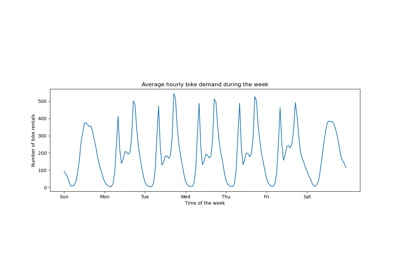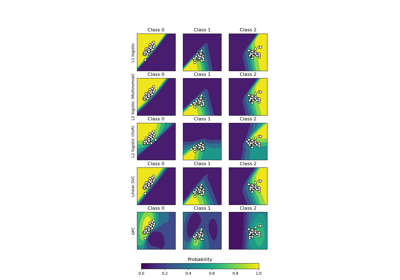Nystroem#
- class sklearn.kernel_approximation.Nystroem(kernel='rbf', *, gamma=None, coef0=None, degree=None, kernel_params=None, n_components=100, random_state=None, n_jobs=None)[source]#
Approximate a kernel map using a subset of the training data.
Constructs an approximate feature map for an arbitrary kernel using a subset of the data as basis.
Read more in the User Guide.
Added in version 0.13.
- Parameters:
- kernelstr or callable, default=’rbf’
Kernel map to be approximated. A callable should accept two arguments and the keyword arguments passed to this object as
kernel_params, and should return a floating point number.- gammafloat, default=None
Gamma parameter for the RBF, laplacian, polynomial, exponential chi2 and sigmoid kernels. Interpretation of the default value is left to the kernel; see the documentation for sklearn.metrics.pairwise. Ignored by other kernels.
- coef0float, default=None
Zero coefficient for polynomial and sigmoid kernels. Ignored by other kernels.
- degreefloat, default=None
Degree of the polynomial kernel. Ignored by other kernels.
- kernel_paramsdict, default=None
Additional parameters (keyword arguments) for kernel function passed as callable object.
- n_componentsint, default=100
Number of features to construct. How many data points will be used to construct the mapping.
- random_stateint, RandomState instance or None, default=None
Pseudo-random number generator to control the uniform sampling without replacement of
n_componentsof the training data to construct the basis kernel. Pass an int for reproducible output across multiple function calls. See Glossary.- n_jobsint, default=None
The number of jobs to use for the computation. This works by breaking down the kernel matrix into
n_jobseven slices and computing them in parallel.Nonemeans 1 unless in ajoblib.parallel_backendcontext.-1means using all processors. See Glossary for more details.Added in version 0.24.
- Attributes:
- components_ndarray of shape (n_components, n_features)
Subset of training points used to construct the feature map.
- component_indices_ndarray of shape (n_components)
Indices of
components_in the training set.- normalization_ndarray of shape (n_components, n_components)
Normalization matrix needed for embedding. Square root of the kernel matrix on
components_.- n_features_in_int
Number of features seen during fit.
Added in version 0.24.
- feature_names_in_ndarray of shape (
n_features_in_,) Names of features seen during fit. Defined only when
Xhas feature names that are all strings.Added in version 1.0.
See also
AdditiveChi2SamplerApproximate feature map for additive chi2 kernel.
PolynomialCountSketchPolynomial kernel approximation via Tensor Sketch.
RBFSamplerApproximate a RBF kernel feature map using random Fourier features.
SkewedChi2SamplerApproximate feature map for “skewed chi-squared” kernel.
sklearn.metrics.pairwise.kernel_metricsList of built-in kernels.
References
Williams, C.K.I. and Seeger, M. “Using the Nystroem method to speed up kernel machines”, Advances in neural information processing systems 2001
T. Yang, Y. Li, M. Mahdavi, R. Jin and Z. Zhou “Nystroem Method vs Random Fourier Features: A Theoretical and Empirical Comparison”, Advances in Neural Information Processing Systems 2012
Examples
>>> from sklearn import datasets, svm >>> from sklearn.kernel_approximation import Nystroem >>> X, y = datasets.load_digits(n_class=9, return_X_y=True) >>> data = X / 16. >>> clf = svm.LinearSVC() >>> feature_map_nystroem = Nystroem(gamma=.2, ... random_state=1, ... n_components=300) >>> data_transformed = feature_map_nystroem.fit_transform(data) >>> clf.fit(data_transformed, y) LinearSVC() >>> clf.score(data_transformed, y) 0.9987...
- fit(X, y=None)[source]#
Fit estimator to data.
Samples a subset of training points, computes kernel on these and computes normalization matrix.
- Parameters:
- Xarray-like, shape (n_samples, n_features)
Training data, where
n_samplesis the number of samples andn_featuresis the number of features.- yarray-like, shape (n_samples,) or (n_samples, n_outputs), default=None
Target values (None for unsupervised transformations).
- Returns:
- selfobject
Returns the instance itself.
- fit_transform(X, y=None, **fit_params)[source]#
Fit to data, then transform it.
Fits transformer to
Xandywith optional parametersfit_paramsand returns a transformed version ofX.- Parameters:
- Xarray-like of shape (n_samples, n_features)
Input samples.
- yarray-like of shape (n_samples,) or (n_samples, n_outputs), default=None
Target values (None for unsupervised transformations).
- **fit_paramsdict
Additional fit parameters.
- Returns:
- X_newndarray array of shape (n_samples, n_features_new)
Transformed array.
- get_feature_names_out(input_features=None)[source]#
Get output feature names for transformation.
The feature names out will prefixed by the lowercased class name. For example, if the transformer outputs 3 features, then the feature names out are:
["class_name0", "class_name1", "class_name2"].- Parameters:
- input_featuresarray-like of str or None, default=None
Only used to validate feature names with the names seen in
fit.
- Returns:
- feature_names_outndarray of str objects
Transformed feature names.
- get_metadata_routing()[source]#
Get metadata routing of this object.
Please check User Guide on how the routing mechanism works.
- Returns:
- routingMetadataRequest
A
MetadataRequestencapsulating routing information.
- get_params(deep=True)[source]#
Get parameters for this estimator.
- Parameters:
- deepbool, default=True
If True, will return the parameters for this estimator and contained subobjects that are estimators.
- Returns:
- paramsdict
Parameter names mapped to their values.
- set_output(*, transform=None)[source]#
Set output container.
See Introducing the set_output API for an example on how to use the API.
- Parameters:
- transform{“default”, “pandas”, “polars”}, default=None
Configure output of
transformandfit_transform."default": Default output format of a transformer"pandas": DataFrame output"polars": Polars outputNone: Transform configuration is unchanged
Added in version 1.4:
"polars"option was added.
- Returns:
- selfestimator instance
Estimator instance.
- set_params(**params)[source]#
Set the parameters of this estimator.
The method works on simple estimators as well as on nested objects (such as
Pipeline). The latter have parameters of the form<component>__<parameter>so that it’s possible to update each component of a nested object.- Parameters:
- **paramsdict
Estimator parameters.
- Returns:
- selfestimator instance
Estimator instance.
Gallery examples#
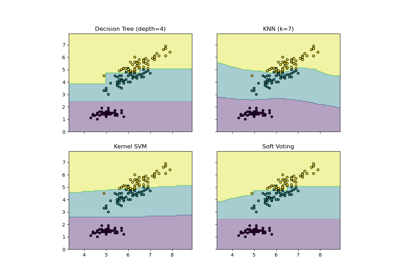
Visualizing the probabilistic predictions of a VotingClassifier
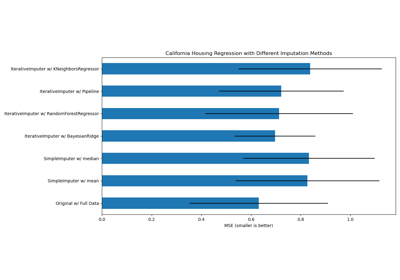
Imputing missing values with variants of IterativeImputer
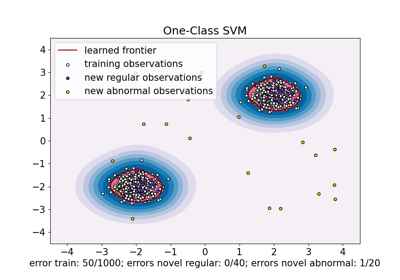
One-Class SVM versus One-Class SVM using Stochastic Gradient Descent
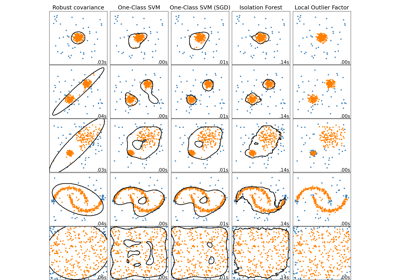
Comparing anomaly detection algorithms for outlier detection on toy datasets
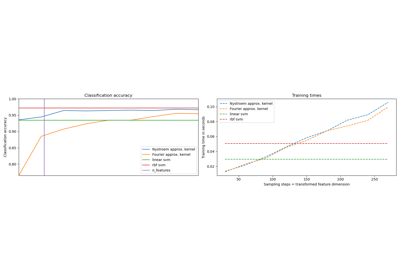
Explicit feature map approximation for RBF kernels

